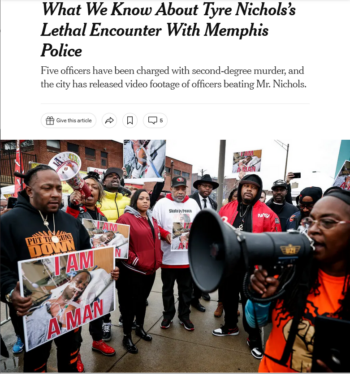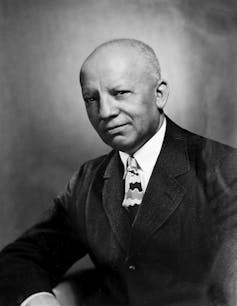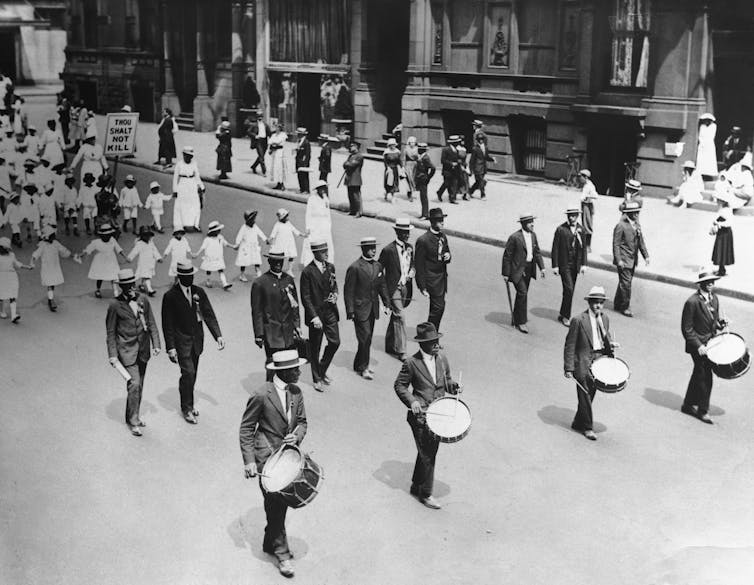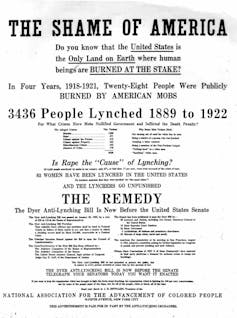
The New York Times (online 1/27/23) writes of the “enduring frustration over Black men having fatal encounters with police officers.”
Yet that’s exactly what the New York Times did in recent coverage. In its January 28 front-page story, reporter Rick Rojas led with an unflinching description of the brutal footage, noting that Nichols “showed no signs of fighting back” under his violent arrest for supposed erratic driving.
Yet just a few paragraphs later, Rojas wrote: “The video reverberated beyond the city, as the case has tapped into an enduring frustration over Black men having fatal encounters with police officers.”
People get frustrated when their bus is late. People get frustrated when their cell phone’s autocorrect misbehaves. If people were merely “frustrated” when police officers violently beat yet another Black person to death, city governments wouldn’t be worried, in the way the Times article describes, about widespread protests and “destructive unrest.”
By describing protest as “destructive,” while describing state-sanctioned law enforcement’s repeated murder of Black people as “Black men having fatal encounters with police officers,” the Times works to soften a blow that should not be softened, to try to deflect some of the blame and outrage that rightfully should be aimed full blast at our country’s racist policing system.
That linguistic soft-pedaling and back-stepping language was peppered throughout the piece, describing how police brigades like the “Scorpion” unit these Memphis police were part of are “designed to patrol areas of the city struggling with persistent crime and violence”—just trying to protect Black folks from ourselves, you see—yet they mysteriously “end up oppressing young people and people of color.” Well, that’s a subject for documented reporting, not conjecture.

The New York Times (2/1/23) doubles down on its new euphemism for “killing.”
When a local activist described himself as “not shocked as much as I am disgusted” by what happened to Tyre Nichols, the Times added, “Still, he acknowledged the gravity of the case”—as if anti-racist activists’ combined anger, sorrow and exhaustion might be a sign that they can’t really follow what’s happening or respond appropriately.
Folks on Twitter (1/28/23) and elsewhere called out the New York Times for this embarrassing “Black people encounter police and somehow end up dead” business, but the paper is apparently happy with it. So much so that the paper came back a few days later with an update (2/1/23), with the headline: “What We Know About Tyre Nichols’ Lethal Encounter With Memphis Police.”
In it, Rojas and co-author Neelam Bohra wrote in their lead, “The stop escalated into a violent confrontation that ended with Mr. Nichols hospitalized in critical condition. Three days later, he died.”
Journalism school tells you that fewer, more direct words are better. So when a paper tells you that a traffic stop “escalated into a violent confrontation that ended up with” a dead Black person, understand that they are trying to gently lead you away from a painful reality—not trying to help you understand it, and far less helping you act to change it.
Originally published on FAIR.org, February 2nd, 2023. Reprinted with permission.
Related Posts:
Book Review: We Do This 'til we FREE US
BLACK AUGUST REMINDS US THAT COINTELPRO DIDN’T END…





